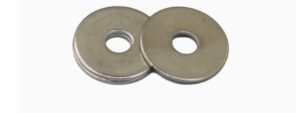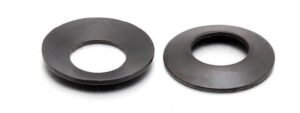Solar energy is one of the fastest-growing sources of renewable energy around the world. As more people and businesses install solar panels, the need for reliable, long-lasting solar systems has become more important than ever. While solar panels often get the most attention, one critical component that plays a big role in their success is the fastener. Fasteners, like screws, bolts, nuts, and washers, are used to hold the solar panels in place, ensuring they stay secure for many years.
Choosing the right fasteners for solar projects is a key decision that can impact the stability, safety, and longevity of the system. In this article, we will walk you through the steps of selecting the best fasteners for your solar energy projects. We’ll discuss important factors like material, corrosion resistance, size, surface treatment, and cost to help you make informed choices.

Understanding the Needs of Solar Installations
Before selecting fasteners, it’s important to understand the requirements of your solar project. Different types of solar systems—whether residential, commercial, or large-scale utility projects—have unique needs when it comes to the materials and performance of the fasteners.
Residential vs. Commercial vs. Utility-Scale Installations
- Residential Solar Installations: These are smaller systems, often installed on rooftops. They require fasteners that can handle various weather conditions, such as wind, rain, and temperature changes.
- Commercial Solar Installations: These systems are larger and can be roof-mounted or ground-mounted. The fasteners need to support heavier panels and provide long-term durability.
- Utility-Scale Solar Projects: These large solar farms need fasteners that are not only strong but also resistant to harsh environmental conditions. They need to be cost-effective but also highly reliable.
Knowing the size and type of installation you are working on will help you choose the right fasteners that can meet the specific demands of each project.
Key Factors to Consider When Choosing Fasteners
Selecting the right fasteners for your solar installation involves looking at several key factors. These factors will ensure that your fasteners perform well and last for many years.
1. Material Selection: Durability and Strength
The material of the fastener is one of the most important factors to consider. Different materials have different strengths, corrosion resistance, and durability, all of which are essential for solar installations. The most common materials used for fasteners in solar energy systems are:
- Stainless Steel fastener : The most popular choice for solar applications, stainless steel fasteners are known for their high corrosion resistance, making them perfect for areas with high humidity or saltwater exposure.
- Aluminum: Aluminum is lightweight and resistant to corrosion. It is often used in solar installations where weight is a concern, like large-scale solar farms.
- Galvanized Steel fastener: Galvanized fasteners are more affordable but still offer adequate corrosion resistance. These are commonly used in commercial solar projects.
- Coated Fasteners: Fasteners with protective coatings such as zinc plating or black oxide can enhance corrosion resistance while offering a clean and polished look.
When choosing the material, think about where the solar panels will be installed. Areas with a lot of rain or salt air require stronger corrosion resistance, so stainless steel or aluminum may be the best option.

2. Corrosion Resistance: Ensuring Longevity
Corrosion is one of the biggest threats to fasteners used in solar installations. Fasteners exposed to harsh weather conditions, such as high humidity, rain, or salty air, can corrode over time, leading to weakened joints and loose panels. This can cause significant damage to the system, including panel misalignment and even system failure.
To avoid this problem, choose fasteners that are highly resistant to corrosion. Stainless steel and aluminum are the best options for areas with lots of moisture, such as coastal locations. Additionally, coatings like zinc plating and Magni coatings can offer extra protection against rust.
For more information about corrosion-resistant fasteners for solar projects, you can refer to this article on essential fastener types for solar projects, which provides in-depth insights into different fastener types and their performance in various solar applications.
3. Size and Specifications: Getting the Right Fit
The size of the fastener is just as important as the material. Fasteners that are too small may not be strong enough to hold the solar panels securely, while fasteners that are too large can cause unnecessary stress on the materials.
Here are some key factors to consider when choosing the right size fastener:
Thread Size and Pitch:
- Common thread sizes for solar installations include M6, M8, and M10. The right thread size will ensure a secure fit between the fastener and the components it’s securing.
Length and Diameter:
- The length and diameter of the fastener should match the materials being joined. Make sure the fastener is long enough to penetrate both parts but not too long to cause over-tightening.
Head Types:
- The head type of the fastener (e.g., hex, round, or pan heads) will depend on the surface of the mounting frame and the tools used for installation.
Make sure to choose the right size fasteners so that they can securely hold everything together without causing stress or damage to the materials.

4. Surface Treatment: Boosting Performance and Protection
Surface treatments can greatly improve the lifespan and effectiveness of fasteners. In solar projects, the treatment you choose can protect fasteners from rust, corrosion, and other types of wear that come with outdoor exposure.
Some common surface treatments for fasteners in solar projects include:
- Zinc Plating: This affordable option provides basic protection against corrosion, ideal for mild environments.
- Magni Coating: This treatment offers superior protection in harsh conditions, such as coastal or industrial environments.
- Anodizing (for Aluminum): This process increases the thickness of the natural oxide layer on aluminum, making it more resistant to corrosion and wear.
5. Cost-Effectiveness: Balancing Quality and Budget
While choosing high-quality fasteners is essential, it’s also important to stay within the project’s budget. The goal is to select fasteners that offer the best value for your money without compromising quality.
Here are some tips for maintaining cost-effectiveness:
- Material Costs: Stainless steel is more expensive but offers superior durability, especially in harsh environments.
- Bulk Purchases: Buying fasteners in bulk can reduce costs, especially for large-scale solar projects.
- Long-Term Savings: While cheaper fasteners may seem cost-effective initially, they can lead to higher maintenance and repair costs in the future if they corrode or fail prematurely.
In large solar projects, it’s often best to strike a balance between quality and cost to ensure long-term reliability without breaking the budget.
Conclusion: Selecting the Right Fasteners for Solar Success
Choosing the right fasteners for solar energy projects is essential to ensuring the stability, safety, and long-term success of the system. By considering factors such as material selection, corrosion resistance, size, surface treatment, and cost, you can make informed decisions that will help your solar installation perform optimally for many years.
Whether you’re working on a small residential system or a large utility-scale solar farm, ensuring that the fasteners are correctly chosen will help secure the panels and maintain the overall structure. For more guidance on fastener selection for solar applications, we recommend exploring Essential Fastener Types for Solar Projects, where you’ll find detailed information on how to choose the best fasteners for various types of solar installations.






